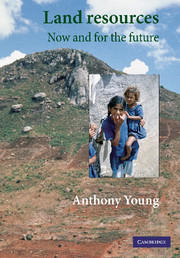Book contents
- Frontmatter
- Contents
- Preface
- Acknowledgements
- Note on acronyms and currency
- 1 Concern for land
- 2 Land resource issues
- 3 Resource survey and land evaluation
- 4 Competition for land
- 5 Working with farmers
- 6 Land use planning
- 7 Land degradation
- 8 Global issues: climatic change and biodiversity
- 9 Monitoring change: land resource indicators
- 10 Costing the earth: the economic value of land resources
- 11 Land management: caring for resources
- 12 Research and technology
- 13 Land, food, and people
- 14 Population, poverty, and conflict
- 15 Awareness, attitudes, and action
- Notes
- References
- Index
8 - Global issues: climatic change and biodiversity
Published online by Cambridge University Press: 04 August 2010
- Frontmatter
- Contents
- Preface
- Acknowledgements
- Note on acronyms and currency
- 1 Concern for land
- 2 Land resource issues
- 3 Resource survey and land evaluation
- 4 Competition for land
- 5 Working with farmers
- 6 Land use planning
- 7 Land degradation
- 8 Global issues: climatic change and biodiversity
- 9 Monitoring change: land resource indicators
- 10 Costing the earth: the economic value of land resources
- 11 Land management: caring for resources
- 12 Research and technology
- 13 Land, food, and people
- 14 Population, poverty, and conflict
- 15 Awareness, attitudes, and action
- Notes
- References
- Index
Summary
The atmosphere, oceans and biosphere are global commons, changes in which affect all human society. There is no doubt that human activity has caused global atmospheric changes, but the effects of these upon climate, and hence upon land productivity, are not known. What matters is not the climatic changes themselves, but preparedness by countries at risk to meet them. Conservation of biodiversity – plant and animal species, ecosystems, and genetic resources – is both a national and a global concern. Ecosystem services, such as regulation of the atmosphere, water, and nutrient cycles, and filtration of wastes, provide benefits to human society of the same order of magnitude as the whole of the world's gross national product. In developing countries, land shortage puts pressures on protected areas, and still more on ecosystem conservation outside these. Whilst international efforts help in the short run, the long-term solution can only come from recognition of the value of conservation by national governments and their people.
The atmosphere and oceans are natural resources which are shared world-wide. Human impact upon them results from the sum of actions by individual nations, and all have some degree of access to the resources they supply. These are commonly referred to as the ‘global commons’.
For the case of the oceans, access is increasingly limited by legal constraints on fishing rights, enforced with difficulty and subject to frequent disputes.
- Type
- Chapter
- Information
- Land ResourcesNow and for the Future, pp. 134 - 142Publisher: Cambridge University PressPrint publication year: 1998



